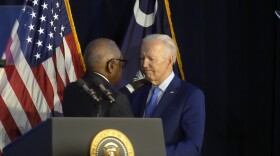-
President Joe Biden on Saturday, Feb. 3, 2024, won the state's Democratic presidential primary. It was the first time Biden's name was on the ballot this cycle.
-
On this episode of the South Carolina Lede for February 3, 2024: a look at the latest moves in the SC Statehouse, including bills that clamp down on social media and pornography; continuing coverage of Democratic First in the Nation primary on Feb. 3; on presidential campaign trail with former SC Gov. Nikki Haley; and more!Leave us a voicemail at 803-563-7169 to share your thoughts about the topics covered on the show or just whatever's on your mind!You can subscribe to South Carolina Lede in Apple Podcasts, Google Podcasts, and wherever you listen to podcasts. You can also follow the show on Twitter @SCLedePod.
-
Democrats in South Carolina must work harder than ever to survive in an era of Republican dominationDemocrats in South Carolina may be holding the nation's first presidential primary. But the party is struggling inside the Southern state.
-
For the first time ever, the race for the Democratic presidential nomination officially kicks off this Saturday in South Carolina.
-
On this episode of the South Carolina Lede for January 30, 2024, host Gavin Jackson has your “Dem Pod,” recapping the major moments of this past month ahead of the first-in-the-nation Democratic presidential primary here in our state this Saturday, Feb. 3. We’ve seen multiple visits from the biggest names in the Democratic party, including Pres. Joe Biden and VP Kamala Harris.Leave us a voicemail at 803-563-7169 to share your thoughts about the topics covered on the show or just whatever's on your mind!You can subscribe to South Carolina Lede in Apple Podcasts, Google Podcasts, and wherever you listen to podcasts. You can also follow the show on Twitter @SCLedePod.
-
President Joe Biden joined South Carolina Democrats Friday, Jan. 27, 2024, for a first-in-the-nation dinner fundraiser in Columbia, S.C.
-
The South Carolina Democratic presidential primary is Feb. 3, 2024.
-
Vice President Kamala Harris spoke at the S.C. NAACP's King Day at the Dome event in Columbia, S.C. on Monday, Jan. 15, 2024.
-
A special election to fill the S.C. Senate seat previously held by the late Sen. John Scott will be Jan. 2, 2024.
-
Republican presidential candidate Nikki Haley is proposing changes to entitlement programs for younger generations, opening the door to potential cuts to Social Security and Medicare if elected. At a campaign rally Monday in South Carolina, Haley promised not to touch the benefits of older people who retired with certain guarantees of a financial future. But she said her children, both in their 20s, are part of the generation for whom benefits should be altered.

Play Live Radio
Next Up:
0:00
0:00
Available On Air Stations










